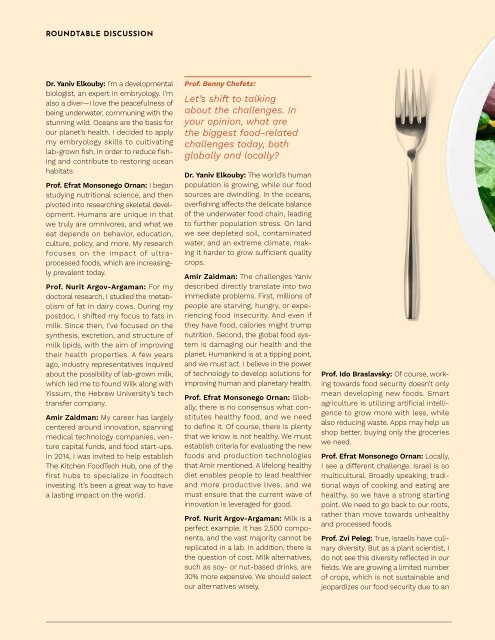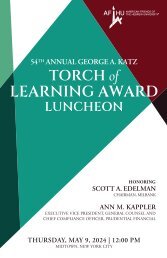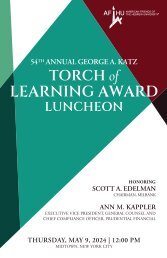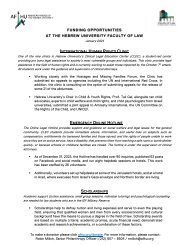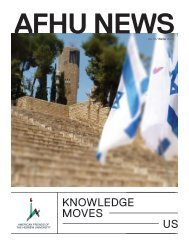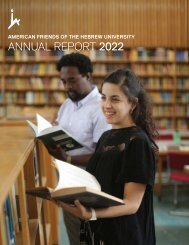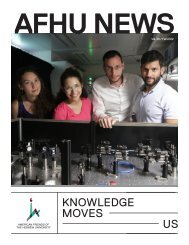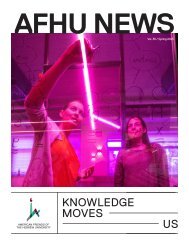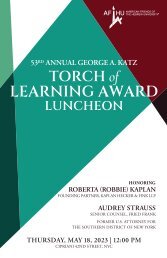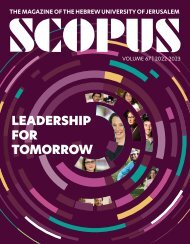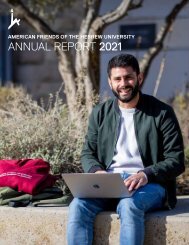Scopus Magazine 2023
You also want an ePaper? Increase the reach of your titles
YUMPU automatically turns print PDFs into web optimized ePapers that Google loves.
Roundtable Discussion<br />
Dr. Yaniv Elkouby: I’m a developmental<br />
biologist, an expert in embryology. I’m<br />
also a diver—I love the peacefulness of<br />
being underwater, communing with the<br />
stunning wild. Oceans are the basis for<br />
our planet’s health. I decided to apply<br />
my embryology skills to cultivating<br />
lab-grown fish, in order to reduce fishing<br />
and contribute to restoring ocean<br />
habitats.<br />
Prof. Efrat Monsonego Ornan: I began<br />
studying nutritional science, and then<br />
pivoted into researching skeletal development.<br />
Humans are unique in that<br />
we truly are omnivores, and what we<br />
eat depends on behavior, education,<br />
culture, policy, and more. My research<br />
focuses on the impact of ultraprocessed<br />
foods, which are increasingly<br />
prevalent today.<br />
Prof. Nurit Argov-Argaman: For my<br />
doctoral research, I studied the metabolism<br />
of fat in dairy cows. During my<br />
postdoc, I shifted my focus to fats in<br />
milk. Since then, I’ve focused on the<br />
synthesis, excretion, and structure of<br />
milk lipids, with the aim of improving<br />
their health properties. A few years<br />
ago, industry representatives inquired<br />
about the possibility of lab-grown milk,<br />
which led me to found Wilk along with<br />
Yissum, the Hebrew University’s tech<br />
transfer company.<br />
Amir Zaidman: My career has largely<br />
centered around innovation, spanning<br />
medical technology companies, venture<br />
capital funds, and food start-ups.<br />
In 2014, I was invited to help establish<br />
The Kitchen FoodTech Hub, one of the<br />
first hubs to specialize in foodtech<br />
investing. It’s been a great way to have<br />
a lasting impact on the world.<br />
Prof. Benny Chefetz:<br />
Let’s shift to talking<br />
about the challenges. In<br />
your opinion, what are<br />
the biggest food-related<br />
challenges today, both<br />
globally and locally?<br />
Dr. Yaniv Elkouby: The world’s human<br />
population is growing, while our food<br />
sources are dwindling. In the oceans,<br />
overfishing affects the delicate balance<br />
of the underwater food chain, leading<br />
to further population stress. On land<br />
we see depleted soil, contaminated<br />
water, and an extreme climate, making<br />
it harder to grow sufficient quality<br />
crops.<br />
Amir Zaidman: The challenges Yaniv<br />
described directly translate into two<br />
immediate problems. First, millions of<br />
people are starving, hungry, or experiencing<br />
food insecurity. And even if<br />
they have food, calories might trump<br />
nutrition. Second, the global food system<br />
is damaging our health and the<br />
planet. Humankind is at a tipping point,<br />
and we must act. I believe in the power<br />
of technology to develop solutions for<br />
improving human and planetary health.<br />
Prof. Efrat Monsonego Ornan: Globally,<br />
there is no consensus what constitutes<br />
healthy food, and we need<br />
to define it. Of course, there is plenty<br />
that we know is not healthy. We must<br />
establish criteria for evaluating the new<br />
foods and production technologies<br />
that Amir mentioned. A lifelong healthy<br />
diet enables people to lead healthier<br />
and more productive lives, and we<br />
must ensure that the current wave of<br />
innovation is leveraged for good.<br />
Prof. Nurit Argov-Argaman: Milk is a<br />
perfect example. It has 2,500 components,<br />
and the vast majority cannot be<br />
replicated in a lab. In addition, there is<br />
the question of cost. Milk alternatives,<br />
such as soy- or nut-based drinks, are<br />
30% more expensive. We should select<br />
our alternatives wisely.<br />
Prof. Ido Braslavsky: Of course, working<br />
towards food security doesn’t only<br />
mean developing new foods. Smart<br />
agriculture is utilizing artificial intelligence<br />
to grow more with less, while<br />
also reducing waste. Apps may help us<br />
shop better, buying only the groceries<br />
we need.<br />
Prof. Efrat Monsonego Ornan: Locally,<br />
I see a different challenge. Israel is so<br />
multicultural. Broadly speaking, traditional<br />
ways of cooking and eating are<br />
healthy, so we have a strong starting<br />
point. We need to go back to our roots,<br />
rather than move towards unhealthy<br />
and processed foods.<br />
Prof. Zvi Peleg: True, Israelis have culinary<br />
diversity. But as a plant scientist, I<br />
do not see this diversity reflected in our<br />
fields. We are growing a limited number<br />
of crops, which is not sustainable and<br />
jeopardizes our food security due to an


